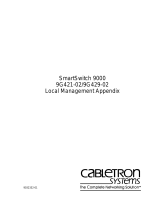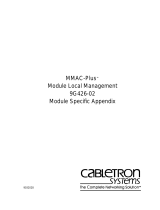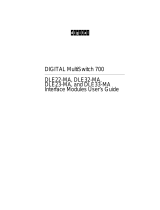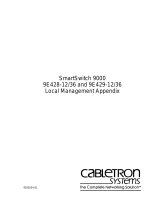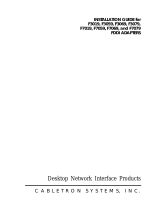Page is loading ...

DIGITAL
MultiSwitch 700MD
DLEHF-MA Interface Module
User’s Guide


DIGITAL
MultiSwitch 700MD
DLEHF-MA Interface Module
User’s Guide
Part Number: 9032624
October 1998
This manual describes the MultiSwitch 700MD Interface Module and
provides information concerning installation, troubleshooting, and the use of
Local Management.
Revision/Update Information:
This is a new document.

Cabletron Systems reserves the right to make changes in specifications and other information
contained in this document without prior notice. The reader should in all cases consult Cabletron
Systems to determine whether any such changes have been made.
The hardware, firmware, or software described in this manual is subject to change without notice.
IN NO EVENT SHALL CABLETRON SYSTEMS BE LIABLE FOR ANY INCIDENTAL,
INDIRECT, SPECIAL, OR CONSEQUENTIAL DAMAGES WHATSOEVER (INCLUDING BUT
NOT LIMITED TO LOST PROFITS) ARISING OUT OF OR RELATED TO THIS MANUAL OR
THE INFORMATION CONTAINED IN IT, EVEN IF CABLETRON SYSTEMS HAS BEEN
ADVISED OF, KNOWN, OR SHOULD HAVE KNOWN, THE POSSIBILITY OF SUCH
DAMAGES.
Copyright 1998 by Cabletron Systems, Inc., P.O. Box 5005, Rochester, NH 03866-5005
All Rights Reserved
Printed in the United States of America
LANVIEW is a registered trademark of Cabletron Systems, Inc.
DIGITAL and the DIGITAL logo are trademarks of Digital Equipment Corporation.
All other product names mentioned in this manual may be trademarks or registered trademarks of
their respective companies.
UNITED STATES GOVERNMENT RESTRICTED RIGHTS
The enclosed product (a) was developed solely at private expense; (b) contains “restricted computer
software” submitted with restricted rights in accordance with Section 52227-19 (a) through (d) of the
Commercial Computer Software - Restricted Rights Clause and its successors, and (c) in all respects
is proprietary data belonging to Cabletron and/or its suppliers.
For Department of Defense units, the product is licensed with “Restricted Rights” as defined in the
DoD Supplement to the Federal Acquisition Regulations, Section 52.227-7013 (c) (1) (ii) and its
successors, and use, duplication, disclosure by the Government is subject to restrictions as set forth in
subparagraph (c) (1) (ii) of the Rights in Technical Data and Computer Software clause at
252.227-7013. Cabletron Systems, Inc., 35 Industrial Way, Rochester, New Hampshire 03867-0505.

FCC Notice — Class A Computing Device:
This equipment generates, uses, and may emit radio frequency energy. The equipment has been type
tested and found to comply with the limits for a Class A digital device pursuant to Part 15 of FCC
rules, which are designed to provide reasonable protection against such radio frequency interference.
Operation of this equipment in a residential area may cause interference in which case the user at his
own expense will be required to take whatever measures may be required to correct the interference.
Any modifications to this device - unless expressly approved by the manufacturer - can void the user's
authority to operate this equipment under part 15 of the FCC rules.
DOC Notice — Class A Computing Device:
This digital apparatus does not exceed the Class A limits for radio noise emissions from digital
apparatus set out in the Radio Interference Regulations of the Canadian Department of
Communications.
Le présent appareil numérique n’émet pas de bruits radioélectriques dépassant les limites applicables
aux appareils numériques de la class A prescrites dans le Règlement sur le brouillage radioélectrique
édicté par le ministère des Communications du Canada.
VCCI Notice — Class A Computing Device:
Taiwanese Notice — Class A Computing Device:
CE Notice — Class A Computing Device:
Warning!
This is a Class A product. In a domestic environment, this product may cause radio interference, in
which case the user may be required to take adequate measures.
Achtung!
Dieses ist ein Gerät der Funkstörgrenzwertklasse A. In Wohnbereichen können bei Betrieb dieses
Gerätes Rundfunkstörungen auftreten, in welchen Fällen der Benutzer für entsprechende
Gegenma
ß
nahmen verantwortlich ist.
Avertissement!
Cet appareil est un appareil de Classe A. Dans un environnement résidentiel cet appareil peut
provoquer des brouillages radioélectriques. Dans ce cas, il peut être demandé à l'utilisateur de prendre
les mesures appropriées.

CABLETRON SYSTEMS, INC. PROGRAM LICENSE AGREEMENT
IMPORTANT: Before utilizing this product, carefully read this License Agreement.
This document is an agreement between you, the end user, and Cabletron Systems, Inc. (“Cabletron”)
that sets forth your rights and obligations with respect to the Cabletron software program (the
“Program”) contained in this package. The Program may be contained in firmware, chips or other
media. BY UTILIZING THE ENCLOSED PRODUCT, YOU ARE AGREEING TO BECOME
BOUND BY THE TERMS OF THIS AGREEMENT, WHICH INCLUDES THE LICENSE AND
THE LIMITATION OF WARRANTY AND DISCLAIMER OF LIABILITY. IF YOU DO NOT
AGREE TO THE TERMS OF THIS AGREEMENT, PROMPTLY RETURN THE UNUSED
PRODUCT TO THE PLACE OF PURCHASE FOR A FULL REFUND.
CABLETRON SOFTWARE PROGRAM LICENSE
1. LICENSE. You have the right to use only the one (1) copy of the Program provided in this
package subject to the terms and conditions of this License Agreement.
You may not copy, reproduce or transmit any part of the Program except as permitted by the
Copyright Act of the United States or as authorized in writing by Cabletron.
2. OTHER RESTRICTIONS
. You may not reverse engineer, decompile, or disassemble the
Program.
3. APPLICABLE LAW
. This License Agreement shall be interpreted and governed under the laws
and in the state and federal courts of New Hampshire. You accept the personal jurisdiction and
venue of the New Hampshire courts.
EXCLUSION OF WARRANTY AND DISCLAIMER OF LIABILITY
1. EXCLUSION OF WARRANTY. Except as may be specifically provided by Cabletron in
writing, Cabletron makes no warranty, expressed or implied, concerning the Program (including
its documentation and media).
CABLETRON DISCLAIMS ALL WARRANTIES, OTHER THAN THOSE SUPPLIED TO
YOU BY CABLETRON IN WRITING, EITHER EXPRESSED OR IMPLIED, INCLUDING
BUT NOT LIMITED TO IMPLIED WARRANTIES OF MERCHANTABILITY AND
FITNESS FOR A PARTICULAR PURPOSE, WITH RESPECT TO THE PROGRAM, THE
ACCOMPANYING WRITTEN MATERIALS, AND ANY ACCOMPANYING HARDWARE.
2. NO LIABILITY FOR CONSEQUENTIAL DAMAGES
. IN NO EVENT SHALL
CABLETRON OR ITS SUPPLIERS BE LIABLE FOR ANY DAMAGES WHATSOEVER
(INCLUDING, WITHOUT LIMITATION, DAMAGES FOR LOSS OF BUSINESS,
PROFITS, BUSINESS INTERRUPTION, LOSS OF BUSINESS INFORMATION, SPECIAL,
INCIDENTAL, CONSEQUENTIAL, OR RELIANCE DAMAGES, OR OTHER LOSS)
ARISING OUT OF THE USE OR INABILITY TO USE THIS CABLETRON PRODUCT,
EVEN IF CABLETRON HAS BEEN ADVISED OF THE POSSIBILITY OF SUCH
DAMAGES. BECAUSE SOME STATES DO NOT ALLOW THE EXCLUSION OR
LIMITATION OF LIABILITY FOR CONSEQUENTIAL OR INCIDENTAL DAMAGES, OR
ON THE DURATION OR LIMITATION OF IMPLIED WARRANTIES, IN SOME
INSTANCES THE ABOVE LIMITATIONS AND EXCLUSIONS MAY NOT APPLY TO
YOU.

CLASS 1 LASER TRANSCEIVERS
THE DELF3-UI FAST ETHERNET INTERFACE MODULE AND
DEL05-UI FDDI PORT INTERFACE MODULE USE CLASS 1 LASER
TRANSCEIVERS. READ THE FOLLOWING SAFETY INFORMATION
BEFORE INSTALLING OR OPERATING THESE MODULES.
The Class 1 laser transceivers use an optical feedback loop to maintain Class 1 operation limits. This
control loop eliminates the need for maintenance checks or adjustments. The output is factory set, and
does not allow any user adjustment. Class 1 laser transceivers comply with the following safety
standards:
• 21 CFR 1040.10 and 1040.11 U.S. Department of Health and Human Services (FDA).
• IEC Publication 825 (International Electrotechnical Commission).
• CENELEC EN 60825 (European Committee for Electrotechnical Standardization).
When operating within their performance limitations, laser transceiver output meets the Class 1
accessible emission limit of all three standards. Class 1 levels of laser radiation are not considered
hazardous.
SAFETY INFORMATION
CLASS 1 LASER TRANSCEIVERS
LASER RADIATION AND CONNECTORS
When the connector is in place, all laser radiation remains within the fiber. The maximum amount of
radiant power exiting the fiber (under normal conditions) is -12.6 dBm or 55 x 10
-6
watts.
Removing the optical connector from the transceiver allows laser radiation to emit directly from the
optical port. The maximum radiance from the optical port (under worst case conditions) is
0.8 W cm
-2
or 8 x 10
3
W m
2
sr-1.
Do not use optical instruments to view the laser output. The use of optical instruments to view
laser output increases eye hazard. When viewing the output optical port, power must be
removed from the network adapter.

DECLARATION OF CONFORMITY
Application of Council Directive(s): 89/336/EEC
73/23/EEC
Manufacturer’s Name: Cabletron Systems, Inc.
Manufacturer’s Address: 35 Industrial Way
PO Box 5005
Rochester, NH 03867
European Representative Name: Mr. J. Solari
European Representative Address: Cabletron Systems Limited
Nexus House, Newbury Business Park
London Road, Newbury
Berkshire RG13 2PZ, England
Conformance to Directive(s)/Product Standards: EC Directive 89/336/EEC
EC Directive 73/23/EEC
EN 55022
EN 50082-1
EN 60950
Equipment Type/Environment: Networking Equipment, for use in a
Commercial or Light Industrial
Environment.
We the undersigned, hereby declare, under our sole responsibility, that the equipment packaged
with this notice conforms to the above directives.
Manufacturer Legal Representative in Europe
Mr. Ronald Fotino Mr. J. Solari
___________________________________ ___________________________________
Full Name Full Name
Principal Compliance Engineer Managing Director - E.M.E.A.
___________________________________ ___________________________________
Title Title
Rochester, NH, USA Newbury, Berkshire, England
___________________________________ ___________________________________
Location Location

DLEHF-MA User’s Guide vii
CONTENTS
PREFACE
Using This Guide..........................................................................xiii
Structure of This Guide.................................................................xiii
Document Conventions................................................................xiv
Related Documentation................................................................xiv
Correspondence............................................................................xv
Documentation Comments ...............................................xv
World Wide Web...............................................................xv
Getting Help...................................................................................xv
SAFETY
Overview......................................................................................xvii
Safety Requirements..................................................................xviii
CHAPTER 1 INTRODUCTION
1.1 DLEHF-MA Overview..................................................................1-1
1.1.1 Connectivity ....................................................................1-3
1.1.2 Full Duplex Switched Ethernet........................................1-3
1.1.3 Auto-Negotiation.............................................................1-3
1.1.4 Management...................................................................1-3
1.1.5 Switching Options...........................................................1-4
1.1.6 Standards Compatibility..................................................1-4
1.1.7 Year 2000 Compliance ...................................................1-4
1.1.8 LANVIEW Diagnostic LEDs............................................1-5
1.1.9 Runtime IP Address Discovery.......................................1-5
1.2 Local Management Features.......................................................1-5
1.2.1 Distributed Chassis Management...................................1-5
1.2.2 Remote Monitoring (RMON)...........................................1-6
1.2.3 Broadcast Suppression...................................................1-6
1.2.4 Port Redirect Function....................................................1-6
1.2.5 SmartTrunk.....................................................................1-6
1.2.6 Additional Local Management Functions........................1-7
1.3 Optional Features........................................................................1-7
CHAPTER 2 NETWORK REQUIREMENTS
2.1 SmartTrunk..................................................................................2-1
2.2 100BASE-TX Network.................................................................2-1
2.3 100BASE-FX Fiber Optic Network ..............................................2-2

Contents
viii DLEHF-MA User’s Guide
CHAPTER 3 INSTALLATION
3.1 Required Tools.............................................................................3-1
3.2 Unpacking the DLEHF-MA...........................................................3-1
3.3 DLEHF-MA Options.....................................................................3-2
3.4 Installing the DLEHF-MA Into the DLM6C-AA Chassis................3-2
3.5 Connecting to the Network...........................................................3-5
3.5.1 Connecting a Twisted Pair Segment to the DELTX-UI....3-5
3.5.2 Connecting a Fiber Optic Segment to the
DELFX-UI and DELF3-UI................................................3-7
3.6 Completing the Installation...........................................................3-9
CHAPTER 4 TROUBLESHOOTING
4.1 Using LANVIEW...........................................................................4-1
4.2 DELTX-UI LED.............................................................................4-4
4.3 Troubleshooting Checklist............................................................4-6
4.4 Using the RESET Button .............................................................4-7
CHAPTER 5 LOCAL MANAGEMENT
5.1 Overview......................................................................................5-1
5.2 Local Management Keyboard Conventions.................................5-2
5.3 Management Terminal Setup.......................................................5-3
5.3.1 Console Cable Connection..............................................5-3
5.3.2 Management Terminal Setup Parameters ......................5-4
5.3.3 Telnet Connections .........................................................5-5
5.3.4 Connecting an Uninterruptible Power Supply..................5-5
5.4 Accessing Local Management.....................................................5-7
5.4.1 Navigating Local Management Screens..........................5-8
5.4.2 Selecting Local Management Menu Screen Items........5-10
5.4.3 Exiting Local Management Screens..............................5-10
5.5 The Main Menu Screen..............................................................5-11
5.6 Chassis Menu Screen................................................................5-12
5.7 Chassis Configuration Screen ...................................................5-14
5.7.1 Setting the IP Address...................................................5-17
5.7.2 Setting the Subnet Mask...............................................5-18
5.7.3 Setting the Chassis Date...............................................5-18
5.7.4 Setting the Chassis Time ..............................................5-19
5.7.5 Entering a New Screen Refresh Time...........................5-20
5.7.6 Setting the Screen Lockout Time..................................5-20

Contents
DLEHF-MA User’s Guide ix
5.7.7 Setting the Operational Mode.......................................5-21
5.8 SNMP Community Names Screen ............................................5-22
5.8.1 Establishing Community Names...................................5-24
5.9 SNMP Traps Screen..................................................................5-25
5.9.1 Configuring the Trap Table...........................................5-26
5.10 Chassis Environmental Screen .................................................5-27
5.11 Port Redirect Function Screen ..................................................5-28
5.11.1 Displaying the Source and Destination Entries.............5-30
5.11.2 Changing Source and Destination Ports.......................5-31
5.12 Module Selection Screen...........................................................5-32
5.12.1 Selecting a Module.......................................................5-33
5.13 DLEHF-MA Module Menu Screen.............................................5-34
5.14 Module Configuration Menu Screen..........................................5-35
5.15 General Configuration Screen...................................................5-38
5.15.1 Setting the IP Address..................................................5-42
5.15.2 Setting the Subnet Mask...............................................5-43
5.15.3 Setting the Default Gateway.........................................5-44
5.15.4 Setting the TFTP Gateway IP Address.........................5-44
5.15.5 Setting the Module Date ...............................................5-45
5.15.6 Setting the Module Time...............................................5-46
5.15.7 Entering a New Screen Refresh Time ..........................5-47
5.15.8 Setting the Screen Lockout Time..................................5-47
5.15.9 Setting the Operational Mode.......................................5-48
5.15.10Setting the Management Mode.....................................5-49
5.15.11Configuring the COM Port.............................................5-49
5.15.11.1 Changing the Com Port Application .............5-51
5.15.12Clearing NVRAM...........................................................5-53
5.15.13Enabling/Disabling IP Fragmentation............................5-54
5.16 SNMP Community Names Screen ............................................5-54
5.16.1 Establishing Community Names...................................5-56
5.17 SNMP Traps Screen..................................................................5-57
5.17.1 Configuring the Trap Table...........................................5-58
5.18 Switch Configuration Screen.....................................................5-59
5.18.1 Setting the STA.............................................................5-61
5.18.2 Setting the Age Time ....................................................5-62
5.18.3 Setting (Enabling or Disabling) the Port Status.............5-62
5.19 SmartTrunk Configuration..........................................................5-63
5.19.1 SmartTrunk Configuration Rules...................................5-63
5.19.2 SmartTrunk Configuration Screen ................................5-64
5.19.3 Enabling the Connection...............................................5-66
5.20 Module Specific Configuration Screen ......................................5-66
5.21 System Resources Screen........................................................5-68
5.21.1 Resetting the Peak Switch Utilization ...........................5-70
5.22 High Speed Interface Configuration Menu Screen....................5-70

Contents
x DLEHF-MA User’s Guide
5.23 High Speed Interface Configuration Screen ..............................5-72
5.23.1 Configuring a DELTX-UI or DELF3-UI
in Port 1 or 2..................................................................5-75
5.23.2 Setting the DELFX-UI and DELF3-UI
Desired Operational Mode ............................................5-75
5.23.3 Configuring a DELTX-UI in Port 1 or 2..........................5-75
5.23.4 Setting the DELTX-UI Desired Operational Mode.........5-75
5.23.5 Setting the DELTX-UI Advertised Ability.......................5-76
5.24 Flash Download Screen.............................................................5-76
5.24.1 Image File Download Using TFTP ................................5-79
5.24.2 Image File Download Using RUNTIME.........................5-80
5.24.3 Image File Download Using BootP................................5-81
5.25 Port Redirect Function Screen...................................................5-82
5.25.1 Displaying the Source and Destination Entries.............5-84
5.25.2 Changing Source and Destination Ports.......................5-84
5.26 Broadcast Suppression Screen .................................................5-85
5.26.1 Setting the Threshold ....................................................5-87
5.26.2 Resetting the Peak Rate ...............................................5-87
5.27 Module Statistics Menu Screen .................................................5-87
5.28 Switch Statistics Screen.............................................................5-89
5.28.1 Using the Clear Counters Command ............................5-91
5.29 The Interface Statistics Screen..................................................5-91
5.29.1 Displaying Interface Statistics .......................................5-95
5.29.2 Using the Clear Counters Command ............................5-95
5.30 RMON Statistics Screen............................................................5-95
5.30.1 Displaying RMON Statistics ..........................................5-99
5.30.2 Using the Clear Counters Command ............................5-99
5.31 Network Tools..........................................................................5-100
5.31.1 Built-in Commands......................................................5-101
5.31.2 Special Commands.....................................................5-112
APPENDIX A SPECIFICATIONS
A.1 Device Specifications.................................................................. A-1
A.2 Physical Properties ..................................................................... A-1
A.3 Environmental Requirements...................................................... A-1
A.4 Input/Output Ports....................................................................... A-2
A.5 COM Port Pinout Assignments................................................... A-2
A.6 Regulatory Compliance............................................................... A-2

Contents
DLEHF-MA User’s Guide xi
APPENDIX B DELTX-UI, DELFX-UI AND DELF3-UI
SPECIFICATIONS
B.1 DELTX-UI....................................................................................B-1
B.2 DELFX-UI....................................................................................B-2
B.3 DELF3-UI.....................................................................................B-3
APPENDIX C OPTIONAL INSTALLATIONS AND
MODE SWITCH BANK SETTINGS
C.1 Required Tools............................................................................C-1
C.2 Setting the Mode Switch..............................................................C-1
C.3 Installing Optional Fast Ethernet Interface Modules....................C-4
INDEX


DLEHF-MA User’s Guide xiii
PREFACE
Welcome to the DIGITAL MultiSwitch 700MD DLEHF-MA Interface
Module User’s Guide. This guide describes the DLEHF-MA Interface
Module and provides information concerning installation,
troubleshooting, and the use of Local Management.
USING THIS GUIDE
Read through this guide completely to understand the interface module
features, capabilities, and Local Management functions.
STRUCTURE OF THIS GUIDE
This guide is organized as follows:
Chapter 1, Introduction, describes the features of the DLEHF-MA.
Chapter 2, Network Requirements, explains the network requirements to
consider before installing the DLEHF-MA.
Chapter 3, Installation, provides instructions on how to install the
module in the chassis and connect segments to the device.
Chapter 4, Troubleshooting, details the DLEHF-MA LANVIEW LEDs
that enable you to quickly diagnose network/operational problems.
Chapter 5, Local Management, describes how to access Local
Management and use of the Local Management screens to manage the
DLEHF-MA interface module and the DLM6C-AA chassis.
Appendix A, Specifications, contains information on functionality and
operating specifications, connector pinouts, environmental requirements,
and physical properties.
Appendix B, DELTX-UI, DELFX-UI and DELF3-UI Specifications,
contains information about DELTX-UI pinouts and information
concerning cable types used with the DELFX-UI and DELF3-UI.
In this document, the DLEHF-MA is also referred to as either
the “MultiSwitch 700MD” or “module.”

Preface
xiv DLEHF-MA User’s Guide
Appendix C, Optional Installations and Mode Switch Bank Settings,
describes how to install optional Fast Ethernet Interface Modules and how
to set the Mode Switches.
DOCUMENT CONVENTIONS
Throughout this guide, the following symbols are used to call attention to
important information.
RELATED DOCUMENTATION
DIGITAL ATM Modular Interface DELHA-UA User’s Guide
DIGITAL FDDI Modular Media Interface DELHF-UA User’s Guide
DIGITAL WAN Modular Interface DELHW-UA User’s Guide
DIGITAL MultiSwitch 700 DLM6C-AA Overview and Setup Guide
DIGITAL Port Based VLAN User’s Guide
DIGITAL OPEN DECconnect Applications Guide or
Cabletron Cabling Guide
Note
symbol. Calls the reader’s attention to any item of
information that may be of special importance.
!
Caution
symbol. Contains information essential to avoid
damage to the equipment.
Electrical Hazard Warning
symbol. Warns against an action
that could result in personal injury or death due to an electrical
hazard.

Correspondence
DLEHF-MA User’s Guide xv
CORRESPONDENCE
Documentation Comments
If you have comments or suggestions about this manual, send them to
DIGITAL Network Products:
World Wide Web
To locate product-specific information, refer to the DIGITAL Network
products Home Page on the World Wide Web at the following locations:
GETTING HELP
Contact your DIGITAL representative for technical support. Before
calling, have the following information ready:
• A description of the failure
• A description of any action(s) already taken to resolve the problem
(e.g., changing mode switches, rebooting the unit, etc.)
• A description of your network environment (layout, cable type, etc.)
• Network load and frame size at the time of trouble (if known)
• The device history (i.e., have you returned the device before, is this a
recurring problem, etc.)
Attn.: Documentation Project Manager
E-MAIL: doc_quality@lkg.mts.dec.com
North America:
http://www.networks.digital.com
Europe:
http://www.networks.europe.digital.com
Asia Pacific:
http://www.networks.digital.com.au


DLEHF-MA User’s Guide xvii
SAFETY
OVERVIEW
Any warning or caution that appears in this manual is defined as follows:
WARNING Warns against an action that could result in
equipment damage, personal injury, or death.
VORSICHT Warnt den Benutzer vor Aktionen, die das
Gerät beschädigen, Personen verletzen oder
sogar zum Tot führen könnten.
DANGER Déconseille à l'utilisateur d'exécuter une action
pouvant entraîner des dommages matériels,
corporels voire même la mort.
AVISO Previene contra una acción que podría dañar
el equipo, provocar daños personales o la
muerte.
CAUTION Contains information essential to avoid
damage to the equipment.
ACHTUNG Liefert wichtige Informationen, um einen
Geräteschaden zu vermeiden.
ATTENTION Informations indispensables permettant
d'éviter les dommages matériels.
PRECAUCIÓN Contiene información esencial para evitar
daños al equipo.
!

Safety
xviii DLEHF-MA User’s Guide
SAFETY REQUIREMENTS
The warnings or cautions that must be observed for the hardware
described in this manual are listed below in English, German, French, and
Spanish.
WARNING Only qualified personnel should install or
service this unit.
VORSICHT Diese Einheit darf nur von qualifizierten
Fachleuten installiert oder gewartet werden.
DANGER L'installation et la maintenance de cet appareil
sont réservées à un personnel qualifié.
AVISO Sólo el personal cualificado debe instalar o dar
mantenimiento a esta unidad.
WARNING The DELF3-UI uses Class 1 lasers. Do not use
optical instruments to view the laser output.
The use of optical instruments to view laser
output increases eye hazard. When viewing
the output optical port, power must be removed
from the network adapter.
VORSICHT Einige DELF3-UI benutzen Laser der Klasse 1.
Zum Ansehen der Laserausgabe dürfen keine
optischen Geräte benutzt werden, da dadurch
das Risiko von Augenverletzungen erhöht wird.
Vor dem Ansehen des optischen Ausgangsan-
schlusses muß der Netzwerkadapter vom Stro-
manschluß getrennt werden.
/
